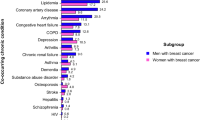Abstract
Introduction
To date, no large studies examining the temporal relationship between colorectal cancer (CRC) and the subsequent development of depressive disorders exist. We aimed to assess the incidence of depression post-colorectal cancer (CRC) diagnosis.
Methods
To conduct this longitudinal study, we searched the large US population-based database, Explorys (IBM), from January 1, 1999, to January 1, 2021. We investigated new-onset depression and its associated mortality as well as the role of the mental health provider post-CRC diagnosis. Confidence intervals were calculated for all outcomes and multivariate regression analysis was performed.
Results
Incident depression post-CRC diagnosis was 20.8 vs 8.9 per 100 person-years [OR 3.46, p < 0.0001] in the general population and conferred a 123% increased risk of all-cause mortality [P < 0.0001]. Male patients (OR: 1.89) were more likely to become depressed post-CRC diagnosis as compared to females. Moreover, the absolute number of male patients with post-CRC depression was significantly higher than that of females (68% vs 32%; P < 0.0001). In addition, depression after CRC was more common among Whites (OR: 1.68) and patients aged > 65 years (OR: 5.17). Referral to a mental health provider resulted in significantly lower all-cause mortality (3.6% vs 26.9%; p < 0.0001).
Discussion
Our findings advocate for initiating depression screening for high-risk patients post-CRC diagnosis and prompt mental health provider referral.
Similar content being viewed by others
References
GBD (2017) Disease and Injury Incidence and Prevalence Collaborators (2018) Global regional and national incidence prevalence and years lived with disability for 354 diseases and injuries for 195 countries and territories 1990–2017: a systematic analysis for the Global Burden of Disease Study 2017. Lancet 392:1789–1858
Center for Behavioral Health Statistics and Quality (2018) 2017 National Survey on Drug Use and Health: Methodological summary and definitions. Substance Abuse and Mental Health Services Administration, Rockville
American Cancer Society (2021) Cancer Facts and Figures 2021. https://www.cancer.org/research/cancer-facts-statistics/all-cancer-facts-figures/cancer-facts-figures-2021.html. Accessed 31 Jan 2021
IBM (2016) The IBM Explorys Platform: liberate your healthcare data. https://www.ibm.com/downloads/cas/4P0QB9JN. Accessed 31 Jan 2021
National Library of Medicine (2019) SNOMED CT. https://www.nlm.nih.gov/healthit/snomedct/index.html. Accessed 31 Jan 2021
Wright S, Strunk A, Garg A (2020) New-onset depression among children adolescents and adults with hidradenitis suppurativa. J Am Acad Dermatol 83:1360–1366
Strunk A, Midura M, Papagermanos V, Alloo A, Garg A (2017) Validation of a case-finding algorithm for hidradenitis suppurativa using administrative coding from a clinical database. Dermatol 233:53–57
Fiest KM, Jette N, Quan H, St Germaine-Smith C, Metcalfe A, Patten SB et al (2014) Systematic review and assessment of validated case definitions for depression in administrative data. BMC Psychiatry 14:289
Massie MJ (2004) Prevalence of depression in patients with cancer. JNCI Monographs 32:57–71
Batty GD, Russ TC, Stamatakis E, Kivimäki M (2017) Psychological distress in relation to site specific cancer mortality: pooling of unpublished data from 16 prospective cohort studies. BMJ 356:j108
Aminisani N, Nikbakht H, Asghari Jafarabadi M, Shamshirgaran SM (2017) Depression anxiety and health related quality of life among colorectal cancer survivors. J Gastrointest Oncol 8:81–88
Goldzweig G, Hubert A, Walach N et al (2009) Gender and psychological distress among middle- and older-aged colorectal cancer patients and their spouses: an unexpected outcome. Crit Rev Oncol Hematol 70:71–82
Gustavsson-Lilius M, Julkunen J, Keskivaara P, Hietanen P (2007) Sense of coherence and distress in cancer patients and their partners. Psycho-Oncol 16:1100–1110
Pudrovska T (2010) Why is cancer more depressing for men than women among older White adults? Soc Forces 89:535–558
Author information
Authors and Affiliations
Contributions
SW, SG, AS, HS, SR, and AS assisted with data acquisition, analyses, and manuscript preparation. SW, SJ, AA, and JDF critically revised the manuscript and provided input regarding methodology. JDF provided direct supervision and guidance. SW and SG are the article guarantors. All authors agree to the final version of this manuscript.
Corresponding author
Ethics declarations
Conflict of interest
The authors declare no competing interests.
Additional information
Publisher's Note
Springer Nature remains neutral with regard to jurisdictional claims in published maps and institutional affiliations.
Simcha Weissman and Sara Ghoneim are the co-first authors of this study.
Supplementary Information
Below is the link to the electronic supplementary material.
Rights and permissions
About this article
Cite this article
Weissman, S., Ghoneim, S., Sanayei, A. et al. New-onset depression after colorectal cancer diagnosis: a population-based longitudinal study. Int J Colorectal Dis 36, 2599–2602 (2021). https://doi.org/10.1007/s00384-021-03994-8
Accepted:
Published:
Issue Date:
DOI: https://doi.org/10.1007/s00384-021-03994-8




